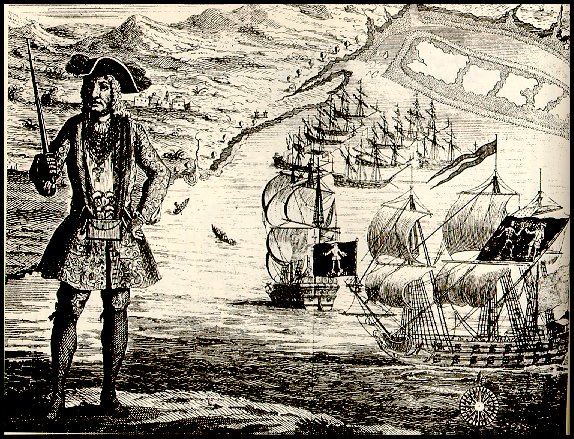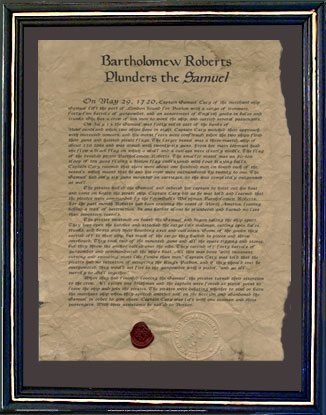
Bartholomew Roberts plunders the Samuel
On May 29, 1720, Captain Samuel Cary of the merchant ship Samuel left the port of London bound for Boston with a cargo of ironware, forty-five barrels of gunpowder, and an assortment of English goods in bales and trunks. She had a crew of ten men to work the ship, and carried several passengers.
On July 13 the Samuel was forty miles east of the banks of Newfoundland when two ships hove in sight. Captain Cary watched their approach with increased concern, and his worst fears were confirmed when the two ships fired their guns and hoisted pirate flags. The larger vessel was a three-masted ship of about 220 tons and was armed with twenty-six guns. From her main topmast head she flew a black flag on which a skull and cutlass were clearly visible. The flag of the dreaded pirate Bartholomew Roberts. The smaller vessel was an 80-ton sloop of ten guns flying a Union flag emblazoned with four blazing balls. Captain Cary reconed that there were about one hundred men on board each of the vessels, which meant that he and his crew were outnumbered by twenty to one. The Samuel had only six guns mounted on carriages, so she was completely out- gunned as well.
The pirates hailed the Samuel and ordered her captain to hoist out his boat and come on board the pirate ship. Captain Cary did as he was told and learned that the pirates were commanded by the formidable Welshman Bartholomew Roberts. For the past month Roberts had been cruising off the coast of North America, leaving behind a trail of destruction. In one harbor alone he plundered and burned no less then seventeen vessels.
The pirates swarmed aboard the Samuel and began taking the ship apart. They tore open the hatches and attacked the cargo like madmen, cutting open bales, trunks and boxes with their boarding axes and cutlasses. Some of the goods they carried off to their ship, but much of the cargo they hacked to pieces and threw overboard. They took two of the mounted guns and all of the spare rigging and stores, but they threw the anchor and cables over the side. They carried off forty barrels of gunpowder and commandeered the ship’s boat. All this was done with “incessant cursing and swearing, more like fiends than men.” Captain Cary was told that the pirates had no intention of accepting the King’s Pardon, and if they ever should be overpowered, they would set fire to the gunpowder with a pistol, “and go all merrily to hell together.”
When they had finished looting the Samuel, the pirates turned their attention to the crew. All except one Irishman and the captain were forced at pistol point to leave the ship and join the pirates. The pirates were debating whether to sink or burn the merchant ship when they spotted another sail on the horizon and abandoned the Samuel in order to give chase. Captain Carey was left with the one Irishman and three passengers. With their assistance he sailed to Boston.
